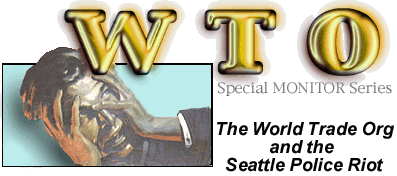
Summaries of under-reported news, short updates on previous Monitor stories
 |
404: Information Missing From Your Daily News
Summaries of under-reported news, short updates on previous Monitor stories |
|
The biggest story on Nov. 30, judging by the primetime devoted to it, was the discovery of graves near Juarez, Mexico that are thought to hold victims of drug cartel murders. This was ABC Nightline's sole topic that evening, and both CBS and CNN led with the story, giving it more time than their entire WTO coverage. On CBS, the WTO segment was the same length as a weather piece -- exactly three minutes. Only CNN's "Inside Politics" show that night offered more than a soundbite discussion of the protests, and the only WTO critic was... Pat Buchanan. "Though right-wing nationalists appeared to make up -- at most -- an infinitesimal fraction of the actual protesters in Seattle's streets, the media seemed to anoint Buchanan as a major leader of the anti-WTO movement," noted the Fairness & Accuracy in Reporting newsletter. Media watchdog FAIR noted that some print media bias even outdid TV. They noted that "anti-trade" became a common -- though wildly inaccurate -- label for the demonstrators, citing a Washington Post article's open: "A guerrilla army of anti-trade activists took control of downtown Seattle today." They also cite an outrageous subhead from the LA Times: "Police Commended for Restraint." Many demonstrators have now returned home and expressed disbelief to find that so little of the protest received mainstream media coverage. We could fill this edition with examples, but consider how just one quote was handled. John Goodman of the United Steelworkers of America -- one of the labor groups protesting at Seattle -- told reporters, "I've witnessed things in the last four days that I didn't believe could happen in America," referring to the police attack on demonstrators. That damning quote only appeared in just a single newspaper -- the Chicago Tribune. (December 5, 1999)
That's why everyone following the WTO protests will want to print and save "This is How We Will Lie to You," a 13-point list written "by the editorial staff at the big dailies." (It's really by the good folks at "Eat The State," a Seattle-based print and Internet weekly.) Their introduction sets the tone: "The World Trade Organization is a complicated topic, and both the talks being held and the variety of protests confronting it are far too complicated for the feeble minds of our readers to fully comprehend. We would never want to inconvenience our readers by giving them information that is complex or contrary to the opinions we've already fed you. Therefore, we're going to lie our fool tushies off during our WTO coverage." The list has two parts: media lies about the WTO itself and about the protests. Here are a couple of samples:
It was a clueless response to legitimate criticism: The Seattle Post-Intelligencer has indeed ignored these issues. A Lexis-Nexis search shows that this year the newspaper has only printed a handful of stories about sweatshops, all of them related to a single suit against local retailers Nordstrom and Cutter & Buck. (The suit was settled in August when these and two other companies agreed to pay $1.25 million for independent monitoring of sweatshop factories.) Perhaps even more one-sided, we find that the newspaper ran a four-part series on genetically modified food and medicine in May that presented it as glorious gee-whiz science with few critics. Since then, the Post-Intelligencer has offered only two short stories on the topic. Given that tens of thousands of protesters are about to fill Seattle city streets, it will be interesting to see how the Post-Intelligencer balances coverage surrounding the WTO Summit. The editors have no one to blame but themselves if they lose credibility. (November 24, 1999)
As reported elsewhere in this issue, Canada is currently trying to use an existing treaty with the U.S. to protect water in the Great Lakes from export demands. But as first reported last March, Sunbelt Ltd., a U.S. company, has filed a lawsuit declaring that Canada broke NAFTA rules by refusing permission to ship fresh water from British Columbia to Southern California. At the time, the company wanted $220 million for alleged loss of profits; now, the company is demanding $10.5 billion. The water would have come from streams that are in areas claimed as Native territory. The region is one of the most important salmon spawning grounds on the Pacific Coast. Canada may well lose; last year, Ethyl Corporation successfully used the same NAFTA loophole to win $19 million from Canadian taxpayers, and force the Canadian government to rescind its ban on a potentially toxic gasoline additive. We also reported in September that many U.S. companies are using NAFTA to sue neighboring countries in secret trials. Another U.S. company forced Canadian authorities to rescind a ban on chemical waste exports and now says it will sue to be compensated for business lost while the ban was in force. Still another U.S. firm has filed a complaint because it was prevented from opening a Mexican waste disposal plant that violated the region's environmental zoning laws. (November 20, 1999)
Albion Monitor Issue 69 (http://www.monitor.net/monitor)
All Rights Reserved.
Contact rights@monitor.net for permission to use in any format.
|